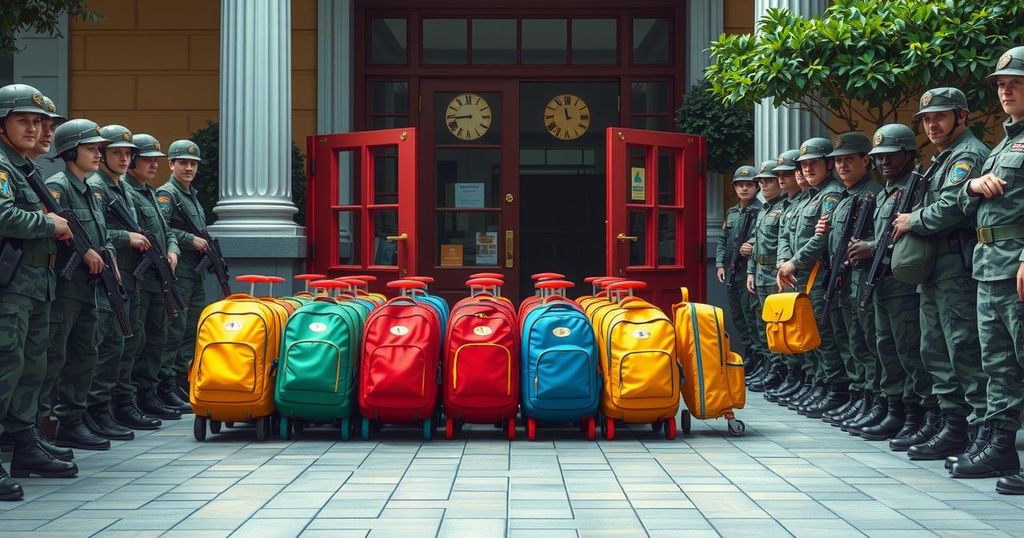Peruvian Schoolchildren Face Growing Threats from Extortion Gangs
Extortion gangs in Peru have increasingly targeted private schools, leading to school closures and online classes due to heightened violence and demand for protection fees. Schools like San Vicente have faced direct threats, forcing parents and children into a climate of fear as gangs escalate violence. The crisis has negatively impacted President Dina Boluarte’s approval ratings amid growing national discontent over safety and security issues.
In Peru, extortion gangs have escalated their threats, now targeting fee-paying schools and demanding large sums for protection. This surge of violence has led to hundreds of private schools closing or moving classes online, reflecting the nation’s deteriorating security situation. Schools like San Vicente in northern Lima experienced direct attacks from gangs, which have instilled fear among staff, parents, and students alike.
The start of the school year has been marred by violence, with San Vicente being attacked after refusing to pay a $27,000 extortion fee. Although no injuries occurred, the incident forced the school to keep its 1,200 students at home for a month. On their return, students encountered heightened security, with soldiers guarding the entrance, a sobering indication of the perilous environment they now face.
Extortion continues to proliferate throughout Latin America, with Peru facing severe challenges from local and international gangs. Experts indicate that the financial gains from extortion surpass those from drug trafficking, making it exceedingly profitable. In response to increasing violence linked to such groups, including the murder of a public figure, the Peruvian government imposed a state of emergency to restore order in Lima.
The prevalence of extortion has forced many schools to halt in-person classes, impacting around 500 private educational institutions across the nation. Giannina Miranda, president of the Freedom to Educate Collective, noted that over 325 schools have temporarily ceased classroom instruction. One father described the situation as “like a pandemic, but with weapons,” articulating the immense fear parents feel about their children’s safety.
Threats have escalated, with schools receiving ominous messages that promise violence if extortion demands are not met. One message claimed, “I already blew up your school and you still have not given me a solution,” which heightened concerns for student safety significantly. Many families are now considering keeping their children at home rather than risk exposure to potential harm.
Despite a reported decline in complaints regarding extortion, authorities acknowledge that fear of retaliation prevents victims from coming forward. In the first quarter of this year alone, Peru recorded its highest homicide rate in two decades. The national climate of fear has adversely affected President Dina Boluarte’s approval ratings, with a recent survey showing that 93 percent of Peruvians disapprove of her handling of the crisis.
The terror instilled by extortion gangs has not only impacted educational environments but also raised serious concerns about the safety and future of communities throughout Peru. Without effective strategies to combat this threat, the well-being of the nation’s children and citizens remains at significant risk.
The situation in Peru highlights the severe implications of gang violence on education and society. Families face difficult decisions regarding their children’s safety, leading to the suspension of classes across numerous private schools. The rise of extortion gangs is reshaping the landscape of private education, fostering an atmosphere of fear that undermines community trust and safety. Enhanced governmental response is crucial to curtail this escalating crisis and restore the public’s confidence.
Original Source: www.france24.com




Post Comment